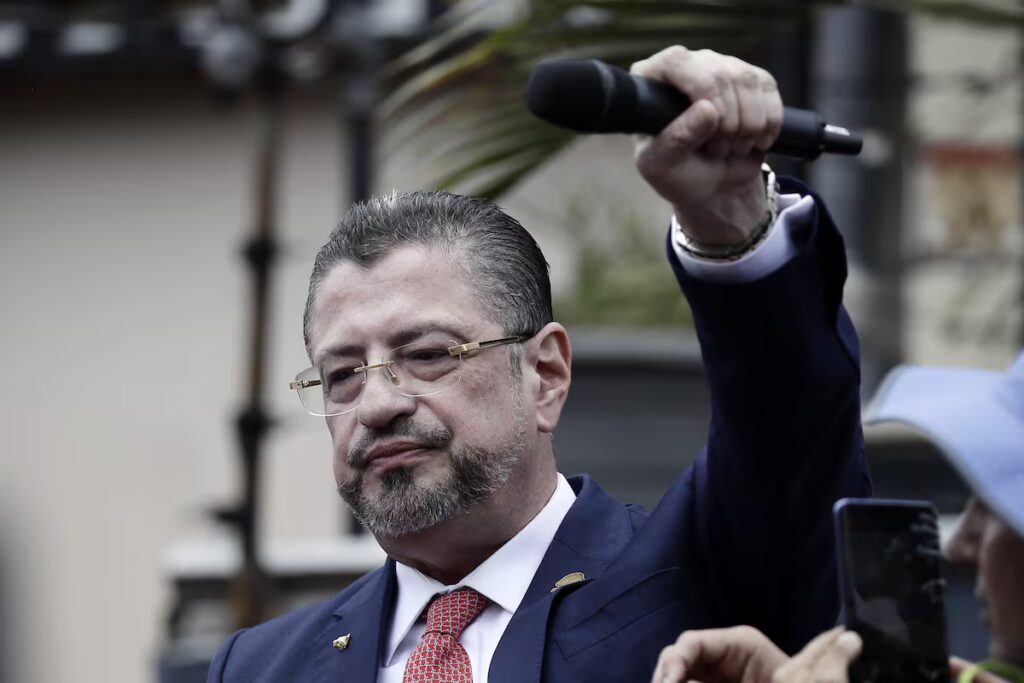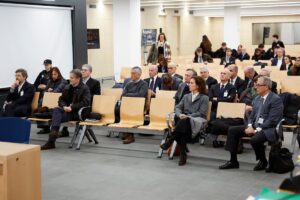
The vast majority of radio and television stations in Costa Rica risk having to stop free-to-air broadcasting by failing to comply with the requirements of a frequency auction ordered by Rodrigo Chaves’ government with the alleged aim of “democratizing” the use of state resources and making companies pay “just enough” for their business. Dozens of broadcasters have announced that they will not be able to submit a bid before midnight on Friday, when the deadline set by the authorities for the trial expires, the effects of which will be a serious blow to freedom of expression and democratic plurality, according to those affected, trade unions, specialists, opposition parties and organisations, including the Catholic Church.
The reform of the radio spectrum usage model, already controversial due to Chaves’ frequent attacks on critical media he promised to destroy, intersects with the tense election campaign marked by the president’s emphasis on his desire to deepen the “peaceful revolution” against traditional elites. The climate of political tension has only worsened with the alarms and claims of the regional, cultural, journalistic and religious media, whose future will depend on judicial requests or last-minute changes accepted by Rodrigo Chaves or by the Superintendence of Telecommunications (Sutel), a technical entity under the protective wing of the Executive.
Parallels with Chavista Venezuela
“Let’s not reduce the frequencies to the highest bidder”, shouted the Episcopal Conference on Monday, speaking on behalf of three Catholic radio stations and a television for lay Catholics, but also of the diversity of the media which would become extinct when the new distribution of frequencies comes into force, still without defined dates. “Defending its existence means defending the possibility that Costa Rica listens to all its voices, not just those that come from economic power,” the bishops said in one of the many statements released on the topic in recent days. Other reproaches are stronger, such as that of Rodolfo Piza, an opposition politician, who underlined a parallel with Hugo Chávez’s Venezuela, where numerous stations closed in 2009 with the justification of non-compliance with the law.
A few minutes after the episcopal statement, the Presidency issued another in which it accuses critics of “misinforming” the public and opens up the possibility of seeking solutions, but only for Catholic or evangelical broadcasters who are hit by the high base prices and the millionaire costs that compliance with the competition requirements would entail. Bidding starts at $386,000 for a national radio station and $1.6 million for a television frequency. The amounts for regional coverage are lower, but equally exorbitant for the media’s business model, also affected by the decline of traditional advertising, their spokespersons complain.
The case has brought together groups of different ideological persuasions, who underline direct damage to the public with fewer economic resources and to the adult population, more tied to traditional radios or religious channels for life. “I thought that if they took away Radio Fides (Catholic) I would move to Santa Clara (Catholic), but now I see that the government will also take away the musicals we have listened to all our lives, Sinfonola or Musical,” says Marta A., 77 years old, resident in a rural area of the province of Alajuela. “Look, I feel angry, like that man wants to come into my house to steal my radio or make me listen to whatever he wants me to listen to,” he exclaimed.
This is how Radio Sinfonola, specialized in retro music and appreciated by the elderly, greeted itself on Friday: “Despite being one of the five stations listened to by Costa Rica, Radio Sinfonola is an SME that does not have the slightest possibility of paying the hundreds of millions that Mr. Chaves’ government makes it pay if it wants to continue to function.” In the sober voice of an announcer, the manager, Carlos Lafuente, added another controversial element to the whole lament: “the 90.3 frequency will be for foreign capital.”
So far, only fifteen companies are known to have registered for the auction. On television, one of the participants is the group of Mexican tycoon Ángel González, which already operates in the country. Another is Televisora de Costa Rica, the company whose owners and newscasters Chaves has dedicated dozens of suspensions for considering them enemies of his government and defenders of the elites he claims to fight. “It’s an irony. This man’s revenge against the owners of Canale 7 has killed us all except them, who have a lot of money to continue operating. For us it’s madness, madness,” said Saray Amador, director of the Telefides channel, which has been broadcasting since 1990 with a staff of 15 employees and dozens of volunteers.
Not all excluded stations are small. The position of the Columbia group was also known on Monday, which hosts four broadcasters, including one of the three main radio journalism platforms in the country of only 5.2 million inhabitants, in an area equivalent to a tenth of Spain. Columbia has reported that its financial model has so far been sustainable, but far from any possibility of reaching the figures requested in the auction, so it will continue to issue only as long as legal objections lodged against the bidding process, including appeals to the Constitutional Court, remain pending.
Critics charge that the ban puts all media in the same basket, regardless of their social or cultural contribution. Not even its geographical origin, as underlined by lawyer and consultant Juan Manuel Campos, who said he personally knew of the interest of the Russian state channel RT, which did not finalize the offer, perhaps due to lack of time to comply with legal requirements. “It is serious that we have arrived at this situation in the country in a climate of animosity against the local media fueled by a discourse of those in power,” he lamented. The practical result, he underlines, is the blackout of most stations of the open model which reaches everyone, including the population without the possibility of accessing payment services. He warned, however, that this closure will not be immediate, as there are legal proceedings to be resolved and Sutel was not clear on the details either.
The political moment is decisive, says historian and communication scientist Patricia Vega, of the University of Costa Rica (UCR), noting several signs of deterioration of the foundations of democracy that has characterized the country, even if she underlines that the assignment of frequencies is not a new struggle. “The country has had that controversy since the 1950s, when Channel 7 was awarded,” Vega points out. Years passed and the frequency model and the amounts the media had to pay for its use were not modernized. This is one of the elements that Chaves has underlined since 2023 when he expressed his intention to change the conditions, always citing Canale 7 as an example. “There were problems that had not been resolved for years and they want to be resolved now, but with the problem that it is a delicate political moment, with a government that follows an authoritarian path,” Vega added as context.
This is also what the candidates and political parties opposed to the Chaves government say, which until October enjoyed the support of 62% of the population, three months before the elections of February 1st and six months before the handover of power in May. In her letter of continuity, presidential candidate Laura Fernández, ahead in the polls, also defends the need to prevent “the party from continuing for years with 71 years of practically free exploitation of frequencies by entrepreneurs who profit from billionaires”.





